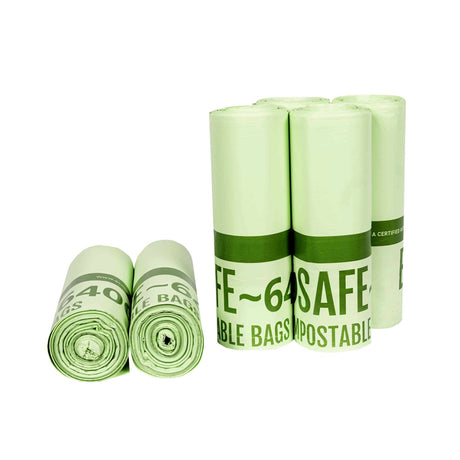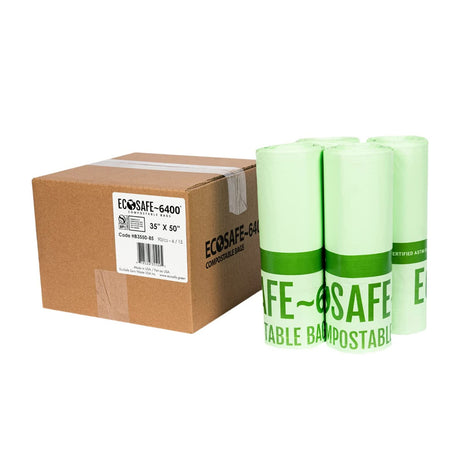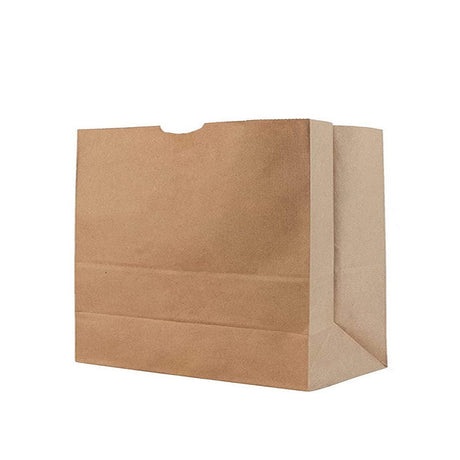Compostable Bags Collection
Compostable packaging is hailed as a solution to plastic pollution. It's single-use if used once, regardless of disposal method.
A move to compostable packaging seems logical, especially in the food industry. It's gaining popularity. For instance, Vegware, a supplier of compostable packaging, saw sales surge by 53% in 2019 and 43% in 2020. KFC in Canada plans to have all consumer-facing packaging home-compostable by 2025.
In line with the commitment to sustainability and eco-friendliness, Patek Packaging proudly shares a compostable bags collection designed to meet your packaging needs while minimizing environmental impact.
What’s the Potential Global Impact of Compostable Packaging?
A report from the Ellen MacArthur Foundation warns that the world might not reach its plastic pact targets, so we need to rethink plastic packaging design and invest in innovation. Only 9% of plastics are recycled, so considering compostable plastics can help reduce global warming. Without action, the annual rate of plastic waste in oceans could increase by 300%, risking the extinction of animals like monk seals and Pacific sea turtles.
Between 2000 and 2010, the world made more plastic than ever, and global plastic production doubled from 2000-2019, reaching 460 million tonnes. Plastics comprise 3.4% of global greenhouse gas emissions, worsening the plastic crisis.
Moving to compostable plastic packaging can benefit oceans, forests, cities, and farms. TIPA offers an alternative to flexible packaging, which is crucial for a circular economy and a sustainable future. A circular economy could reduce ocean plastic by 80% yearly and cut greenhouse gas emissions by 25%.
Unlike regular plastic in landfills, compostable packaging doesn't produce methane when it breaks down. Composting creates nutrient-rich soil for plants, from home gardens to commercial farms.
Advantages of Compostable Packaging
- Compostable packaging breaks down into natural elements, reducing the burden on landfills and minimizing pollution.
- Often created from renewable resources like plant-based materials (e.g., cornstarch, sugarcane), reducing dependence on finite fossil fuels.
- Composting creates nutrient-rich soil for soil health and supports plant growth.
- Composting organic waste generates fewer greenhouse gas emissions than traditional landfilling or incineration.
- Once fully decomposed, it becomes nutrient-rich organic matter, ideal for plants.
- Many consumers are conscious of environmental issues and prefer products packaged in compostable materials.
Sushi Tray Uses
Compostable bags have many uses in different industries:
Food Waste Collection
They're handy for collecting food scraps in homes, restaurants, and food service places for easier composting.
Composting
These bags help in composting by containing organic materials for efficient decomposition.
Retail Packaging
Retailers use them as eco-friendly alternatives to plastic bags for packaging items like groceries and clothing.
Lawn and Garden Waste
They're useful for collecting yard waste like grass clippings and leaves, making it easier to transport to composting facilities or for home composting.
Biomedical Waste
In healthcare, they're used to safely dispose of certain types of waste, like non-infectious materials.
Events and Festivals
These bags are often provided at gatherings to collect waste, promoting sustainability.
Packaging for Organic Products
Businesses selling organic goods use these bags for packaging, aligning with sustainability values.
Horticulture and Agriculture
They're used in agriculture for various purposes like seedling pots and packaging organic fertilizers.
Industrial Applications
In industries, they serve purposes like packaging components or transporting goods in eco-sensitive areas.
Compostable vs. Biodegradable: What’s the Difference?
|
Aspect |
Compostable Packaging |
Biodegradable Packaging |
|
Breakdown Setting |
Requires specific composting conditions. |
Can break down in landfills or other environments. |
|
Breakdown Speed |
Typically faster decomposition process (a few months to a year). |
Variable timeframe for breakdown (could take several years). |
|
Material Types |
Made from organic materials like cornstarch or sugarcane. |
Can be made from various organic or synthetic materials. |
|
Disposal |
Needs to be disposed of in composting facilities. |
Can be disposed of in various waste management systems. |
|
Toxins Produced |
Does not produce toxins during decomposition. |
May produce toxins during breakdown. |
|
Environmental Impact |
Can turn into nutrient-rich soil. |
May leave behind a few natural elements. |
|
Certification |
Often certified by organizations like BPI or DIN CERTCO |
May not always have standardized certification. |
|
Environmental Role |
Offers the potential to improve soil quality. |
Provides a solution to minimize environmental impact. |
Compostable Green Bags
Introducing Patek Packaging’s EcoSafe | 35x50" Compostable Green Bags (90 Pcs), the eco-conscious solution to traditional plastic bags. These green bags are crafted from certified compostable resin which can help to decompose it naturally, leaving no harmful residues behind.
These are practical and eco-friendly substitutes for single-use plastic. Perfect for various purposes, from kitchen scraps to gardening.
Explore Patek Packaging's Compostable Bags Collection
Check out Patek Packaging's Compostable Bags Collection for eco-friendly packaging that's high-quality and good for the environment. Using our eco bags, you help reduce plastic waste without sacrificing performance. Purchase yours now.
Frequently Asked Questions
How Are Compostable Plastics Different From Rpet and Pet?
PET (polyethylene terephthalate) is a plastic type used for food containers. Both recycled PET and PET itself aren't biodegradable. Whether recycled or not, regular plastics don't break down for two reasons: their chemical bonds are too strong, and their molecules don't break down naturally. Compostable plastic, however, can break down in a specific compost environment when exposed to heat, humidity, and oxygen.
How Long Does It Take for Compostable Plastics To Break Down?
In industrial compost conditions, like controlled aerobic environments, compostable packaging breaks down within three months and fully biodegrades within six months. In-home compost conditions, like the temperature in a home composter, these processes take up to six months to break down and up to 12 months to fully biodegrade.
Are Compostable Bags as Durable as Plastic Bags?
Compostable bags may not be as durable as traditional plastic bags, especially for heavy or sharp objects. However, they are designed to be strong enough for typical use, such as collecting kitchen scraps or carrying groceries.
- Featured
- Best selling
- Alphabetically, A-Z
- Alphabetically, Z-A
- Price, low to high
- Price, high to low
- Date, old to new
- Date, new to old
FiltersFilter & Sort
EcoSafe | 35x50" Compostable Green Bags - 90 Pcs
$97.95Unit price /UnavailableEco-Friendly Kraft Paper Bag 11.75+6.5x11" - 250 Pcs
$35.00$41.95Unit price /Unavailable



